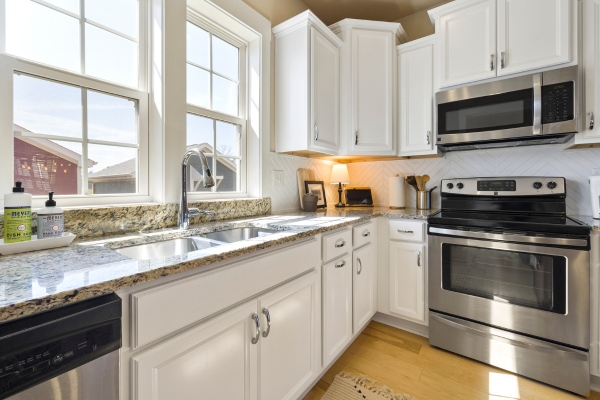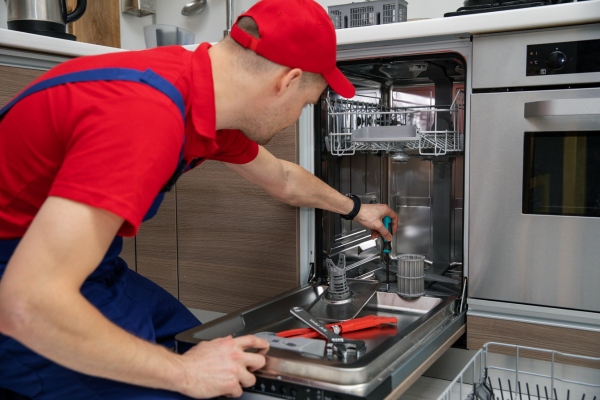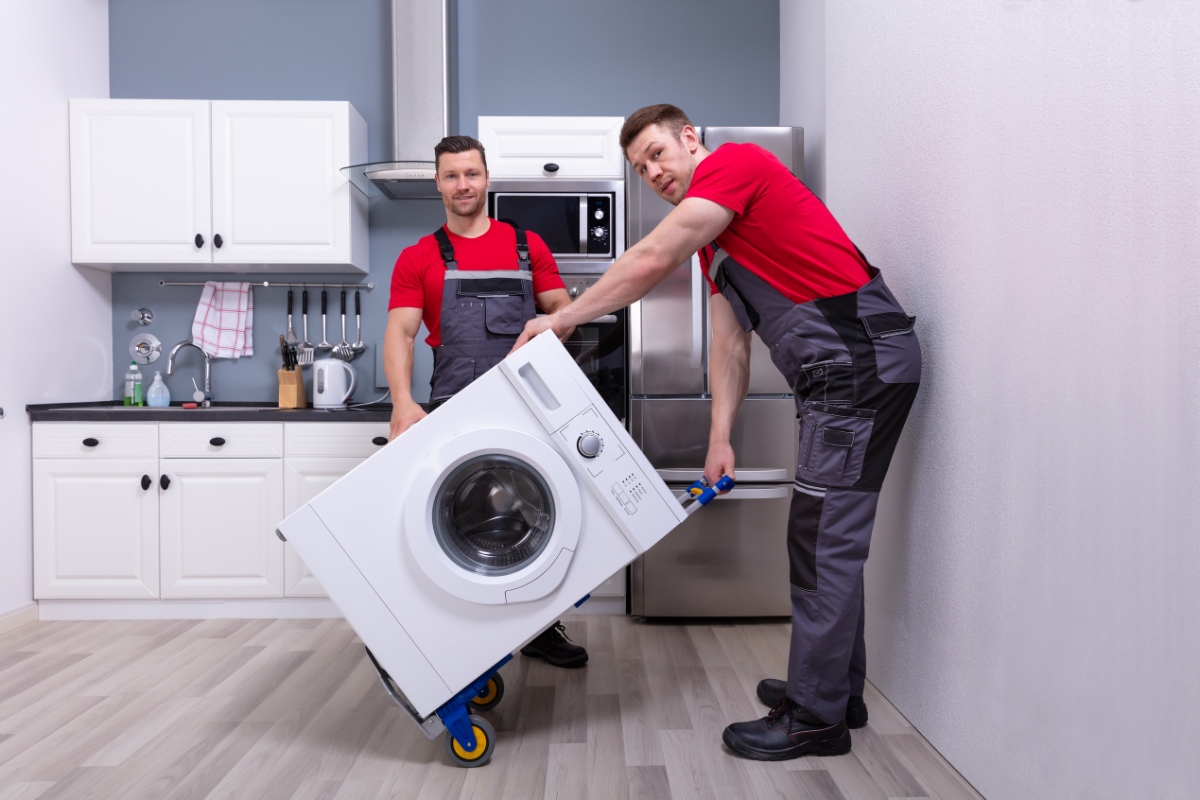When selling a house, kitchen appliances typically stay with the property while laundry appliances are negotiable. Sellers can legally remove any non-permanent fixtures, but should consider market expectations and buyer preferences.
What Usually Stays vs Goes:
- Kitchen appliances stay: refrigerator, oven, dishwasher, microwave
- Laundry appliances negotiable: washers and dryers stay only 50% of the time
- Everything is negotiable unless permanently attached to the property
Critical Requirements:
- FHA loans require all included appliances to work properly
- Matching stainless steel appliances add $5,982 in value (141% ROI)
- Broken appliances significantly reduce offers or kill deals
Strategic Approach:
- State inclusions clearly in listing to avoid confusion
- Use appliances as negotiation tools to close price gaps
- Consider local market norms and current conditions when deciding
The decision ultimately depends on your specific situation and market conditions. In seller’s markets, you have more flexibility to exclude appliances without losing buyers, while buyer’s markets often require including quality appliances to stand out from competition. Consult with your real estate agent about local expectations and use appliances strategically to maximize your sale price. Whether keeping or leaving appliances, ensure everything works properly and matches in style to create the best impression on potential buyers.

Kitchen Appliances Usually Stay, Laundry Appliances Are Negotiable
Real estate professionals with nearly 25 years of experience share a general pattern with appliances. Kitchen appliances nearly always stay with the home. Laundry appliances only stay about half of the time. This pattern holds true across most markets, according to NAR research and statistics.
Typically, the seller includes all kitchen appliances in the home sale. This includes the refrigerator, oven, dishwasher, and built-in microwave. This is likely the status quo since it’s more convenient for everyone involved. Moving these appliances between properties creates unnecessary hassle and expense. For those who need to sell your house quickly, leaving appliances can speed up the process.
Moreover, the more appliances moved, the greater the risk of damage to walls and floors. Improper lifting, packing, and moving techniques can cause significant problems. If damage occurs during the move, the seller may need to cover repair costs. The purchase agreement terms usually determine who pays for any damages. HUD guidelines provide additional information on property transfer standards.
Industry experts share that appliances are up for grabs in the laundry room. Buyers care less about these appliances than those in the kitchen. When deciding whether to take the washer and dryer, sellers should consult their agent. Understanding what is customary in your market helps you make informed decisions.
For instance, if sellers typically leave washers and dryers in your market, buyers may expect them. Your buyer may push for these appliances to remain with the property. On the other hand, if you’ve received multiple bids, buyers likely won’t back out over laundry machines. Strong buyer interest gives you more negotiating power on appliance inclusions. Companies that buy houses cash often make offers regardless of appliance inclusions.
FHA Loans Require All Included Appliances to Work Properly
If the buyer is purchasing the home with an FHA loan, included appliances must meet specific guidelines. The Federal Housing Administration sets these requirements for the loan to close. Understanding these rules prevents delays during the closing process when selling a house. The FHFA website offers comprehensive loan requirement details.
Key FHA appliance requirements include:
- All appliances included in the sale that contribute to market value must be operational.
- If utilities are shut off during appraisal, appraisers assume everything works properly.
- The home’s electrical system must adequately support all appliances included in the sale.
- FHA-defined appliances include refrigerators, ranges, ovens, dishwashers, disposals, microwaves, washers, and dryers.
- Sellers are off the hook for other home systems like trash compactors and spas.
This ensures safety and functionality for the new owners. Electrical capacity affects what appliances can stay with the property. This clarification helps sellers understand their obligations under FHA loan requirements. Meeting these standards protects both parties throughout the transaction. If you want to sell my house fast for cash Massachusetts, understanding these requirements is crucial.
Regardless of Tradition, Sellers Still Choose Which Appliances to Keep
Even where cultural norms exist, it’s still up to the seller to decide. You can take your appliances with you or leave them behind. Nearly everything is negotiable in real estate, and appliances are no exception. Your personal needs should guide your final decision when selling a house. Consumer Finance Bureau housing resources explain your rights as a seller.
Consider these scenarios when deciding:
- A seller may want to keep their beloved, high-end refrigerator for their new home.
- Including appliances can attract more buyers and move negotiations forward effectively.
- If the gap between buyer’s offer and asking price equals appliance value, use them strategically.
- Taking all your appliances “is a hassle” for buyers but rarely stops sales completely.
Real estate professionals confirm this move won’t typically derail a property purchase. The seller could offer the appliances as a concession to close the deal. To avoid confusion, experts recommend that sellers clarify their intentions upfront when possible. State clearly in the listing which appliances you plan to keep or leave. Real estate professionals clarify that seller and buyer must finalize the matter before signing the purchase agreement. Clear communication from the start prevents misunderstandings and keeps transactions smooth. We Buy Houses Here understands the importance of clear appliance agreements.
Appliances Can Increase or Decrease Your Home’s Value
When it comes to adding value and marketability to your home, not all appliances are equal. Some upgrades provide excellent returns while others offer minimal benefit when selling a house. Smart appliance choices make your home more attractive to potential buyers. Check real estate data catalogs for market value trends.
Follow these best practices for maximum return:
- Purchase matching kitchen appliances consistent in finish, age, and brand when possible.
- Choose appliance brands based on your home’s price point and target buyer expectations.
- Refresh old appliances on a budget using DIY tips before investing in replacements.
- Repair or replace broken appliances before listing to maintain buyer interest and value.
Industry professionals often recommend strategic replacements to maintain appliance consistency throughout the kitchen. This creates visual harmony that buyers appreciate and value. Survey data shows that 75% of real estate agents confirm stainless steel remains most popular. On average, new stainless steel appliances for the kitchen cost $4,229 and add $5,982 in value. That’s a 141% return on investment that makes the upgrade worthwhile. For those seeking an instant cash offer for house, upgraded appliances can increase your offer amount.
Buy Matching Kitchen Appliances
According to recent industry reports, buyers prioritize style over everything else with kitchen appliances. Real estate experts advise homeowners to sell their home with matching appliances when possible. Consistency in finish, age, and brand creates a cohesive, polished look. Fannie Mae’s education portal provides valuable homeowner resources.
Key points for matching appliances:
- If you have a newer refrigerator and dishwasher but an old stove, replace the stove first.
- The stove should match similar quality or value to the other appliances perfectly.
- Visual harmony that buyers appreciate and value increases your home’s appeal significantly.
- Survey data shows 75% of agents confirm stainless steel remains most popular among homebuyers.
If all of your appliances are dated, consider upgrading the entire set to boost home value. On average, new stainless steel appliances for the kitchen cost $4,229 and add $5,982 in value. That’s a 141% return on investment that makes the upgrade worthwhile when selling a house. This creates a modern, cohesive kitchen space that buyers want. Businesses that buy homes often appreciate well-maintained appliances.
Select Appliance Brands Based on Your Home’s Price Point
Upgrade your appliances in accordance with your home’s price point. Most homebuyers will appreciate mid-range appliances from recognizable brands such as GE, Samsung, and Whirlpool. These brands offer reliability and quality without excessive cost. They meet expectations for most price ranges perfectly.
Brand selection guidelines by price point:
- Mid-range homes benefit from recognizable brands like GE, Samsung, and Whirlpool appliances.
- Luxury homes require high-end appliances from premium brands like Wolf or Thermador specifically.
- Mismatched appliance quality can bring down your home value and deter serious buyers.
- Appliance quality must align with property price to send the right message effectively.
Luxury buyers want top-tier quality that matches their investment expectations and lifestyle needs. Real estate professionals warn that mismatched quality sends the wrong message to potential buyers when selling a house. Proper brand selection demonstrates attention to detail and quality throughout your home. If you need to sell my house as is quickly Massachusetts, the appliance condition still matters.
Update Old Appliances on a Budget
If your kitchen style dates back to the 1970s, don’t bother upgrading those yellowed appliances. New appliances in an old kitchen won’t persuade buyers to raise their offer significantly. Industry experts call this “putting lipstick on a pig” because it doesn’t address the real issue. The outdated kitchen design needs a complete refresh, not just new appliances. The Consumer Finance Bureau’s owning a home guide offers renovation advice.
Budget-friendly appliance updates include:
- Apply stainless steel Con-Tact paper on the dishwasher or refrigerator for aesthetic appeal.
- Replace old, grease-caked burner grates and drip pans to improve your stove’s appearance.
- Update your oven’s exterior with new, contemporary range knobs for instant refresh.
- Cover dishwasher door with beadboard or cabinetry panel to blend with kitchen cabinets.
These DIY tips improve appearance without major investment or extensive renovation work when selling a house. Clean grates make a significant visual difference in your kitchen for minimal cost. Modern knobs instantly refresh the appliance’s appearance and create updated style. Companies offering cash for houses Worcester MA typically accept homes regardless of appliance age.
Fix or Replace Broken Appliances Before Listing
If an appliance isn’t working properly, consider repairing or replacing it before listing your home. Otherwise, you can expect some buyers to lower their offer price significantly. You might lose buyer interest in your home completely over broken appliances when selling a house. Working appliances demonstrate that the home has been properly maintained.
Important considerations for broken appliances:
- Buyers may lower their offer price significantly if appliances don’t work properly.
- Broken appliances can cause you to lose buyer interest in your home completely.
- All appliances must be functional for FHA loans or the loan cannot close.
- Working appliances demonstrate proper home maintenance and care to potential buyers.
As mentioned previously, if you are selling to a buyer backed by an FHA loan, this requirement is mandatory. Their loan cannot close without all included appliances in working order at closing time. This requirement protects both buyer and seller during the transaction process and ensures fairness. Library of Congress real estate guides provide additional property standards information.
Safety Guidelines for Moving Appliances to Your New Home
When moving selected appliances to your new home, keep safety top of mind throughout the process. You don’t want to damage the appliances, your home, or yourself in the process. Proper planning and technique prevent costly accidents and injuries during the move when selling a house. For those saying “I want to sell my house urgently Worcester MA,” leaving appliances eliminates this hassle.
Essential safety tips for moving appliances:
- Hire professional movers with experience handling heavy items like appliances and hot tubs.
- Disconnecting and removing an appliance costs between $35 and $85 per item professionally.
- Use proper equipment including appliance dolly, furniture blankets, straps, and sliders always.
- Drain all appliances at least one day before moving to remove moisture.
- Measure appliances and pathways carefully to ensure they fit through door frames.
The safest route is to hire a moving professional with experience moving heavy items effectively. Move-in installation starts at $75 and ensures proper setup in your new home safely. If you forgo hiring professional movers, take your time moving the appliances carefully and methodically. Proper measurements prevent frustrating problems on moving day and protect your investment. Learn more about us and our hassle-free buying process.

Timing Your Appliance Decisions for Maximum Profit
When selling a house, timing plays a crucial role in your appliance decisions. The right timing can maximize your return on investment and attract more buyers. Poor timing can lead to wasted money on upgrades that don’t pay off. Understanding when to act helps you make smart financial choices. eHome America provides homeowner education on market timing.
When to Upgrade Appliances Before Listing Your Home
Upgrading appliances requires careful timing when selling a house to ensure maximum return. Ideally, you should upgrade appliances three to six months before listing your property. This timeframe allows you to enjoy the new appliances briefly while they still look pristine. It also gives you time to address any installation issues before buyers view your home.
Strategic timing considerations include:
- Upgrade immediately if your appliances are over 10 years old or visibly outdated.
- Replace broken appliances at least two weeks before listing to avoid rushed decisions.
- Coordinate upgrades with other renovations to minimize disruption and maximize impact on buyers.
- Avoid upgrading during peak moving season when installation costs are typically higher.
If you’re selling a house within the next month, assess whether upgrades are worthwhile. Last-minute appliance upgrades can delay your listing and may not provide sufficient return. In fast markets, buyers may prefer to choose their own appliances anyway. Consider offering a credit instead of rushing to install new appliances before showing. To get a cash offer for my house Worcester MA, appliance condition impacts valuation.
How Market Conditions Affect Appliance Negotiation Power
Market conditions significantly impact your negotiating power when selling a house with or without appliances. In a seller’s market, you have more leverage to exclude appliances without losing buyers. In a buyer’s market, including quality appliances can give your home a competitive edge. Understanding current market dynamics helps you make strategic appliance decisions. Framework Homeownership offers market analysis resources.
Market-based appliance strategies include:
- Seller’s market: Keep high-end appliances and negotiate firmly on inclusions without buyer pushback.
- Buyer’s market: Include all appliances to sweeten the deal and stand out from competition.
- Balanced market: Use appliances strategically as negotiation tools to close price gaps effectively.
- Hot market: Focus on speed over appliances since buyers prioritize securing the property quickly.
In competitive markets when selling a house, buyers often submit offers without requesting appliance inclusions. They want to secure the property before competing buyers make stronger offers. In slower markets, buyers scrutinize every detail and expect more appliances to be included. Monitor your local market conditions and adjust your appliance strategy accordingly for best results. If you need to sell your home fast for cash in Massachusetts, market conditions matter less.
Seasonal Considerations for Appliance Inclusion in Home Sales
Seasonal timing affects buyer expectations and appliance decisions when selling a house throughout the year. Spring and summer are peak selling seasons when buyers have higher expectations for move-in ready homes. Fall and winter markets move slower, making appliance inclusions more valuable as selling points. Aligning your appliance strategy with seasons can improve your sales outcome.
Season-specific appliance considerations include:
- Spring: Buyers expect updated appliances and are willing to pay premium prices for them.
- Summer: Family buyers prioritize functional kitchens and may negotiate harder for appliance inclusions.
- Fall: Including appliances can differentiate your home as inventory increases and competition grows.
- Winter: Appliance inclusions become stronger incentives as fewer buyers are actively searching for homes.
When selling a house during holiday seasons, appliance inclusions can attract motivated buyers seeking quick moves. Tax season in early spring also influences buyer behavior and appliance negotiation strategies significantly. Buyers receiving tax refunds may be less concerned about appliance inclusions during this period. Understanding these seasonal patterns helps you time your appliance decisions for maximum profit and appeal. Companies that buy houses cash Massachusetts purchase year-round regardless of season.
Conclusion
Handling appliances when selling a house requires strategic thinking and careful planning throughout the entire process. Understanding what buyers expect in your market helps you make informed decisions about inclusions. Whether you keep or leave your appliances, timing and condition play crucial roles in success. Match your appliances to your home’s price point and ensure everything works properly before listing. Clear communication in your listing prevents confusion and keeps negotiations smooth with potential buyers.
Remember that appliances can be powerful negotiation tools when selling a house in any market condition. Use them strategically to attract buyers, close price gaps, or sweeten deals when needed. Consider seasonal trends and market conditions to maximize your appliance decisions for better returns. If you do take appliances with you, prioritize safety and proper planning during the move. Make smart choices now to ensure a profitable sale and seamless transition to your new home. To get a cash offer for my house Massachusetts or if you want to buy my house Worcester MA, contact us today for a hassle-free solution.
FAQs
Should I leave my washer and dryer when selling a house?
It depends on your local market customs and buyer expectations in your area. Consult your real estate agent to understand what’s typical and use this knowledge strategically.
Do kitchen appliances always stay with the home during a sale?
Kitchen appliances typically stay because it’s more convenient for both buyers and sellers involved. However, sellers ultimately decide what to include or exclude from the final home sale.
What happens if my appliances don’t work when selling a house?
Buyers may lower their offer price or lose interest in your home completely. For FHA loans, all included appliances must work properly or the loan cannot close.
When should I upgrade my appliances before listing my home for sale?
Upgrade three to six months before listing to maximize your return on investment effectively. This gives you time to address installation issues and keeps appliances looking pristine.
Can I negotiate appliances as part of my home sale agreement?
Yes, appliances are negotiable and can be used strategically to close price gaps. State your intentions clearly in the listing to prevent misunderstandings during negotiations later.








